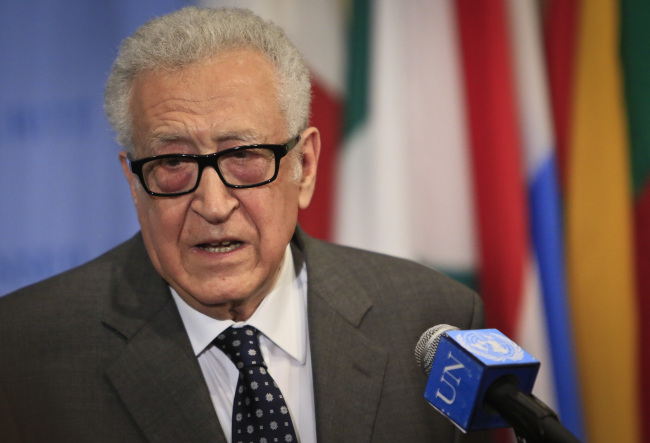Brahimi resigns as U.N.-Arab League special envoy to Syria
By Korea HeraldPublished : May 14, 2014 - 21:04
UNITED NATIONS (AP) ― Lakhdar Brahimi is resigning as the international point man on Syria, the U.N. chief announced Tuesday, marking a second failure by the United Nations and Arab League to end the country’s worsening civil war and highlighting the deep divisions among the Syrian parties and key countries on how to restore peace.
With Brahimi at his side, U.N. Secretary-General Ban Ki-moon said the joint U.N.-Arab League envoy will step down on May 31 after nearly two years. Brahimi will be following in the footsteps of his longtime friend, former U.N. Secretary-General Kofi Annan, who resigned from the same job in August 2012 after failing to broker a cease-fire as the country descended into civil war.
Ban blamed Syria’s opposition but especially the government; the divided U.N. Security Council, which has been impotent; and feuding influential nations for failing to help Brahimi achieve a peace agreement.
With Brahimi at his side, U.N. Secretary-General Ban Ki-moon said the joint U.N.-Arab League envoy will step down on May 31 after nearly two years. Brahimi will be following in the footsteps of his longtime friend, former U.N. Secretary-General Kofi Annan, who resigned from the same job in August 2012 after failing to broker a cease-fire as the country descended into civil war.
Ban blamed Syria’s opposition but especially the government; the divided U.N. Security Council, which has been impotent; and feuding influential nations for failing to help Brahimi achieve a peace agreement.

“He has faced almost impossible odds, with a Syrian nation, Middle Eastern region and wider international community that have been hopelessly divided in their approaches to ending the conflict,” Ban said. “That his efforts have not received effective support from the United Nations body that is charged with upholding peace and security, and from countries with influence on the Syrian situation, is a failure of all of us.”
Brahimi managed to get officials from President Bashar Assad’s government and the opposition to two rounds of U.S. and Russian-brokered peace talks in Geneva aimed at establishing a transitional government, but they ended without an agreement.
He had been working behind the scenes to start a new round of Geneva negotiations, but that effort was all but doomed when Assad’s government announced that elections would be held on June 3. With Assad running for reelection and virtually certain to win, both Brahimi and Ban have indicated it would be impossible to get the opposition to participate in new negotiations.
Brahimi told reporters after a final closed briefing to the U.N. Security Council that he had suggested seven steps that could lead to “a serious peace process.”
He also revealed that Iran has a four-point plan to end the conflict ― a cease-fire, formation of a national unity government, a constitutional review that would include limiting the president’s powers and presidential and parliamentary elections.
“Their ideas are interesting and I think probably will be considered,” Brahimi said.
Ban pledged to keep working for peace and said he would appoint a successor to Brahimi but would take time to find “the right person.”
Diplomats speaking on condition of anonymity because discussions have been private said candidates mentioned include former Tunisian Foreign Minister Kamel Morjane, former Australian Prime Minister Kevin Rudd, former U.N. Mideast envoy Michael Williams from Britain and former top NATO and European Union official Javier Solana from Spain.
Brahimi, 80, is a former Algerian foreign minister and longtime U.N. diplomat and troubleshooter in hotspots from Afghanistan to Iraq.
Ban called the failure of “one of the world’s most brilliant diplomats” to end the conflict despite “his extraordinary talents ... a tragedy for the Syrian people.”
The secretary-general renewed his appeal to the Syrian government and opposition “to show the wisdom and sense of responsibility that could allow a way out of this nightmare.” He also urged everyone involved, including states with influence over the Syrian parties, “to reflect deeply on what we should do at this moment to generate hope of a better future for the people of Syria.”
Brahimi said he was “humbled” by Ban’s words on an occasion “which is not very pleasant for me” and apologized to the Syrian people for not being able to help them “as much as we should have.”
-
Articles by Korea Herald







![[Graphic News] More Koreans say they plan long-distance trips this year](http://res.heraldm.com/phpwas/restmb_idxmake.php?idx=644&simg=/content/image/2024/04/17/20240417050828_0.gif&u=)
![[KH Explains] Hyundai's full hybrid edge to pay off amid slow transition to pure EVs](http://res.heraldm.com/phpwas/restmb_idxmake.php?idx=644&simg=/content/image/2024/04/18/20240418050645_0.jpg&u=20240419100350)








![[KH Explains] Hyundai's full hybrid edge to pay off amid slow transition to pure EVs](http://res.heraldm.com/phpwas/restmb_idxmake.php?idx=652&simg=/content/image/2024/04/18/20240418050645_0.jpg&u=20240419100350)

![[Today’s K-pop] Illit drops debut single remix](http://res.heraldm.com/phpwas/restmb_idxmake.php?idx=642&simg=/content/image/2024/04/19/20240419050612_0.jpg&u=)